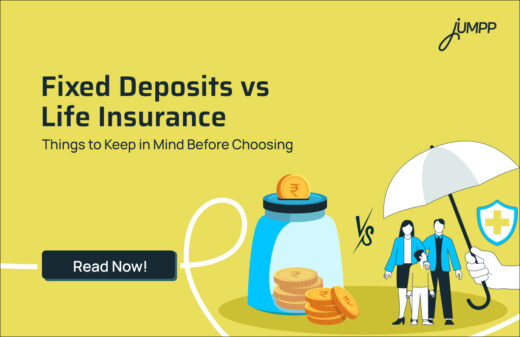Deductible in Health Insurance- Meaning, Types & Working

In India, we’re careful with money. Whether it’s buying groceries, fuel, asking for extra dhaniaa, or even purchasing a new scooter, we always look for full value. But when it comes to insurance, many people miss out on one crucial detail: the deductible in insurance.
You must have heard this kind of story at least once. Someone’s father needs hospitalisation, and the total bill comes to ₹80,000. Everyone feels relieved because there’s health insurance. But later, the family finds out that the insurer will only cover ₹60,000. Now, why not the full amount?
This gap is because of something called a deductible in health insurance. It is a condition that decides how much you need to pay from your pocket before the insurance company starts covering the costs.
In this article, we will explain what is deductible in health insurance, how it works, and why knowing this small detail can help you make smarter and more confident insurance decisions for your family.
What is Deductible in Health Insurance?
When you buy health insurance, you expect your medical bills to be taken care of. But there’s a part of the cost you may have to pay yourself before the insurance company steps in. This amount is called a deductible.
It is the fixed amount you agree to pay from your pocket when you make a health insurance claim. Only after this amount is paid does the insurer begin to pay the rest of the medical bill.
Many people in India don’t fully understand how deductibles work in health insurance, and that often leads to a financial crisis when filing a claim.
If your health plan has a ₹20,000 deductible and your hospital bill is ₹1,00,000, the insurer will pay ₹80,000. The first ₹20,000 must be paid by you.
In simple words, deductible in medical billing is the amount that you need to pay first.
Deductible in insurance with an example
Let’s say you have a health insurance plan with a ₹10,000 deductible.
Now, if you get hospitalised due to unexpected illness and your total bill come to ₹50,000, your deductible in medical billing will work like this-
- You will pay the first ₹10,000 from your own pocket.
- The insurance company will then pay the remaining ₹40,000.
So even though your insurance policy covers a larger amount, like ₹5 lakh, it will only pay after you’ve paid your ₹10,000 deductible.
Take control of your finances today—start with our powerful expense tracker app to manage spending while staying protected with the right health insurance plan.
Types of Deductibles in Insurance
When you buy any insurance policy, especially health or motor insurance, there’s often a small condition called a deductible.
But not all deductibles in insurance are the same. Let’s understand the different types.
1. Compulsory Deductible
This is a mandatory amount that you have to pay every time you make a claim. You don’t get a choice. The insurance company fixes this amount at the time of policy issue.
Let’s say you own a car and your car insurance policy mentions a compulsory deductible of ₹2,000. If your car suffers damage worth ₹15,000, you will first pay ₹2,000, and the insurance company will pay the remaining ₹13,000.
2. Voluntary Deductible
This is where you decide how much deductible you are willing to pay during a claim. If you agree to take on a higher share of risk, the insurance company rewards you by offering a discount on your premium.
You choose a voluntary deductible of ₹5,000 to reduce your yearly premium. Later, when you file a claim of ₹40,000, you will have to pay ₹5,000 first, and the insurer will pay ₹35,000.
This type is ideal for people who want to save on premiums and are confident they won’t make frequent claims.
3. Aggregate Deductible
This type works differently. Instead of applying per claim, the deductible applies to the total expenses in a policy year.
Your policy has an aggregate deductible of ₹20,000. In the first few months, you make multiple small claims: ₹5,000, ₹8,000, ₹9,000. You keep paying these from your pocket. Once your total spending reaches ₹20,000, any future claims in that year will be fully covered by the insurance company.
How Does a Deductible in Medical Billing Work?
Let’s say that you have a health insurance policy with a deductible of ₹10,000. One day, your mother is hospitalised and the total hospital bill comes to ₹60,000.
- Step 1: You will first pay the ₹10,000 deductible from your own pocket.
- Step 2: The insurance company will then pay the remaining ₹50,000, as per your policy terms.
Now, imagine if the total bill was ₹9,000, which is below your deductible. In this case, the insurer won’t pay anything. You will bear the full cost.
So, a deductible in insurance is like a minimum amount that you must manage yourself before the policy helps you.
Why Do Insurance Companies Use Deductibles?
Now, if I am paying premiums, why do I also have to pay a deductible?
There are a few important reasons:
1. To avoid small claims
If insurance paid for every small bill, like ₹300 for a doctor visit or ₹700 for a checkup, the system would become too expensive. Deductibles in health insurance help filter out such small, frequent claims.
2. To reduce misuse and fraud
Some people might misuse insurance if there were no conditions. Deductibles make people more careful and responsible while using their policies.
3. To lower premiums
This is good news for you. If you choose a higher deductible, the insurer offers a discount on your premium. That means you pay less every year just by agreeing to take on a bit more risk.
So, in a way, deductibles are not just a cost—they also help you save money in the long run.
Now, does a deductible sound more like a copayment to you?
In reality, it’s not!
Tap here to understand everything about copayment!
One Policy, Three Charges: Know How Deductible, Copay, and Coinsurance Affect Your Bill
These three terms often confuse people because they sound similar. But they all work differently. Let’s make it easy.
A deductible is the fixed amount you need to pay from your own pocket before the insurance company starts covering your medical expenses.
For example, if your deductible is ₹10,000, the insurer will only start paying once your hospital bill goes beyond that amount.
A copayment means you agree to pay a certain percentage of every medical bill. So, if your policy has a 10 percent copay and your bill is ₹50,000, you will pay ₹5,000 while your insurer pays the rest.
Coinsurance is similar to copayment but usually applies after the deductible is paid. It is also a percentage split. For instance, if your coinsurance is 20 percent, you pay 20 percent of the bill and the insurer pays 80 percent.
All three affect how much you pay during claims, so it’s important to understand them clearly.
Is Deductible in Health Insurance Compulsory?
Among deductible, copayment, and coinsurance, none of them is always compulsory in every health insurance policy. It depends on the type of plan you choose.
- Some basic health insurance plans may not have any of these.
- Deductibles are more common in top-up or super top-up policies, where you agree to pay a fixed amount before the insurer steps in.
- Copayment is often included in policies for senior citizens or when you’re getting treatment outside your network hospital.
- Coinsurance is not very common in Indian health insurance policies, but can appear in some specialised plans.
So, it’s not that one is compulsory for all. These are cost-sharing terms, and whether they apply or not will be clearly mentioned in your policy document.
Deductible vs Copayment vs Coinsurance
| Term | What It Means | When It Happens | Who Pays What |
| Deductible | Fixed amount you pay before the insurer pays anything | At the start of the claim | You pay first (say ₹10,000), the insurer pays the rest |
| Copayment (Copay) | You share a part of every medical bill | Every time you use the policy | You pay a fixed % (like 10% or 20%) of the total bill |
| Coinsurance | You and the insurer split costs in a fixed ratio | Usually, after the deductible is paid | You may pay 20%, the insurer pays 80%, depending on the policy |
How to Choose the Right Deductible in Your Health Insurance?
Choosing a deductible in your health insurance policy depends on your health, lifestyle, age, and medical background.
Here are a few things to think about before deciding:
1. Do You Have a Pre-existing Illness?
If you already have a health condition like diabetes, asthma, or a heart problem, going for a deductible may not be a smart choice. That’s because such conditions usually need regular treatment, check-ups, and sometimes hospitalisation. And every time you raise a claim, you’ll have to pay the deductible from your own pocket.
2. Are You Generally Healthy?
If you don’t have any long-term illness and hardly visit the hospital, then a deductible can actually work in your favour. Why? Because you’re unlikely to file frequent claims. And when you add a deductible to your policy, your premium becomes cheaper.
3. What’s Your Age?
Young people, especially those in their 20s or early 30s, are usually less likely to face serious health issues. If you’re young and don’t need medical attention too often, choosing a deductible can be a good way to save money on premiums.
But if you’re buying insurance for your parents or elderly relatives, it’s better to avoid deductibles. Senior citizens are more likely to need hospitalisation, which means more claims and more out-of-pocket expenses if there’s a deductible.
4. How’s Your Lifestyle?
If you smoke regularly, drink too much, eat unhealthy food, or barely move throughout the day, your chances of falling sick are higher. Lifestyle habits have a direct link to diseases like diabetes, high blood pressure, obesity, and more.
In such cases, a deductible might end up being a burden. You could land in the hospital more often, and each time, you’ll be paying the deductible before the policy steps in.
5. What About Family Medical History?
If your family has a strong history of chronic illnesses or lifestyle diseases, you should think twice before adding a deductible. Even if you’re healthy now, you may be more prone to the same issues later. And if you do get diagnosed, you’ll likely need regular treatment, meaning more claims and more out-of-pocket payments under a deductible setup.
Final Word
In short, a deductible is a great way to reduce your insurance premium, but only if you don’t expect to use the policy often. If you’re someone with regular medical needs, a family history of illness, or poor lifestyle habits, then avoiding a deductible is safer. Always balance the short-term savings with your long-term health risk
Always check the deductible terms in your policy before signing up. A small detail today can make a big difference tomorrow.
Read about what is health insurance policies and its types in India!
Deductible in Insurance- FAQs
A deductible is the fixed amount you pay from your pocket before your health insurer starts covering medical expenses. It helps lower your premium.
If your deductible is ₹10,000 and your hospital bill is ₹50,000, you pay ₹10,000 first. The insurer pays the remaining ₹40,000.
Copay is a fixed share you pay on every claim, while deductible is paid once before coverage begins. Deductibles reduce premiums but increase upfront costs.
Deductibles prevent small, frequent claims and promote responsible use of health insurance. They help keep premiums affordable.
You need to check your policy’s deductible amount and subtract it from your total bill. The insurer only pays what goes above that limit.
A high deductible can increase out-of-pocket costs during emergencies. It may also delay claim benefits for smaller bills.
An aggregate deductible is the total amount you pay from your pocket in a policy year before insurance kicks in. Once it’s met, all claims are fully covered.






